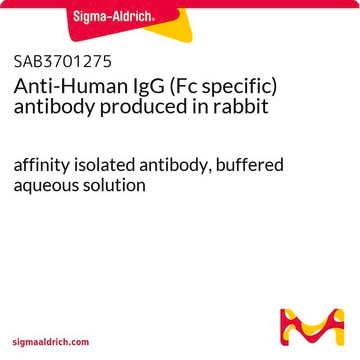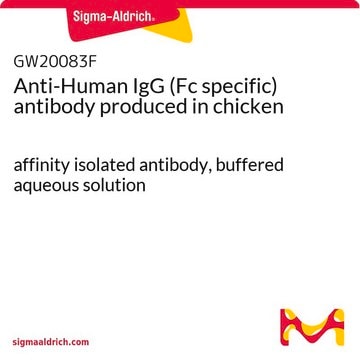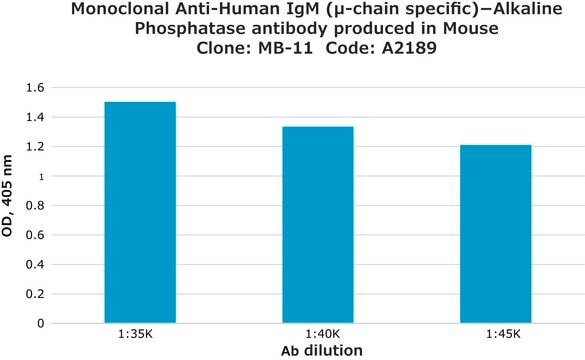I6260
Monoclonal Anti-Human IgG (Fc specific) antibody produced in mouse
clone GG-7, ascites fluid
Sign Into View Organizational & Contract Pricing
All Photos(1)
About This Item
Recommended Products
biological source
mouse
Quality Level
conjugate
unconjugated
antibody form
ascites fluid
antibody product type
secondary antibodies
clone
GG-7, monoclonal
contains
15 mM sodium azide
technique(s)
indirect ELISA: 1:40,000
isotype
IgG1
shipped in
dry ice
storage temp.
−20°C
target post-translational modification
unmodified
General description
Human IgGs are glycoprotein antibodies that contain two equivalent light chains and a pair of identical heavy chains. IgGs have four distinct isoforms, ranging from IgG1 to IgG4. These antibodies regulate immunological responses to allergy and pathogenic infections. IgGs have also been implicated in complement fixation and autoimmune disorders . Monoclonal Anti-Human IgG (Fc specific) antibody detects the Fc portion, but not the Fab portion, of human IgG. Additionally, the antibody does not react with IgA, IgM, and immunoglobulin light chains.
Immunoglobulin G (IgG) belongs to the immunoglobulin family and is a widely expressed serum antibody. An immunoglobulin has two heavy chains and two light chains connected by a disulfide bond. It is a glycoprotein and mainly helps in immune defense. IgG is usually found as a monomer. About 70 percent of the total immunoglobulin consists of IgG. Immunoglobulin G (IgG) participates in hypersensitivity type II and type III.
Specificity
Monoclonal Anti-Human IgG (Fc specific) antibody recognizes the fragment of crystallization (Fc) region of human immunoglobulin G (IgG) as determined by an enzyme-linked immunosorbent assay (ELISA).
Immunogen
Purified human IgG myeloma proteins covalently coupled to polyaminostyrene (PAS) microbeads
Application
Monoclonal Anti-Human IgG (Fc specific) antibody has been used:
- to study the relationship between cell size, cell cycle and specific recombinant protein productivity
- in the label-free homogeneous assay to identify inhibitors of a4b7 integrin-mediated cell adhesion to mucosal addressin cell adhesion molecule (MadCAM)
- in enzyme-linked immunosorbent assay
Monoclonal Anti-Human IgG (Fc specific) antibody is suitable for use in indirect ELISA (1:5,000).
Biochem/physiol Actions
IgG (immunoglobulin G) antibody provides protection against bacterial, fungal and viral infections. The Fc (fragment crystallization tail) region of the antibody is implicated in complement activation in which it elicits an immune response by binding to the Fc receptor on macrophages. The Fc region also serves as a site for rheumatoid factor (autoantibody directed to Fc) attachment and protein A binding. A certain population of lymphocytes also possess a "Fc receptor". These functions indicate the importance of immunoreagents specific for the Fc fragment of Human IgG.
Physical form
This product is provided as ascites fluid with 0.1% sodium azide as a preservative.
Storage and Stability
For continuous use, store at 0-5 ͦC. For extended storage, the solution may be frozen in working aliquots. Repeated freezing and thawing is not recommended. Storage in "frost-free" freezers is not recommended. If slight turbidity occurs upon prolonged storage, clarify the solution by centrifugation before use.
Disclaimer
Unless otherwise stated in our catalog or other company documentation accompanying the product(s), our products are intended for research use only and are not to be used for any other purpose, which includes but is not limited to, unauthorized commercial uses, in vitro diagnostic uses, ex vivo or in vivo therapeutic uses or any type of consumption or application to humans or animals.
Not finding the right product?
Try our Product Selector Tool.
Storage Class Code
10 - Combustible liquids
WGK
nwg
Flash Point(F)
Not applicable
Flash Point(C)
Not applicable
Certificates of Analysis (COA)
Search for Certificates of Analysis (COA) by entering the products Lot/Batch Number. Lot and Batch Numbers can be found on a product’s label following the words ‘Lot’ or ‘Batch’.
Already Own This Product?
Find documentation for the products that you have recently purchased in the Document Library.
Customers Also Viewed
Relationship between cell size, cell cycle and specific recombinant protein productivity
Lloyd D R, et al.
Cytotechnology, 34(1-2), 59-70 (2000)
A label-free approach to identify inhibitors of alpha4-beta7-mediated cell adhesion to MadCAM
Bova M P, et al.
Journal of Biomolecular Screening, 16(5), 536-544 (2011)
DEVELOPING AN ALTERNATE HOST FOR PRODUCTION OF BIOSIMILAR ANTI-EGFR MONOCLONAL ANTIBODY
Motiwala H M, et al.
International Journal of Pharmacy and Biological Sciences, 16(5), 536-544 (2012)
Role of antibodies in cancer targeting
Attarwala Husain
Journal of natural science, biology, and medicine, 1(1), 53-53 (2010)
Youmin Su et al.
International journal of molecular sciences, 24(22) (2023-11-25)
The interaction between integrin α4β7 and mucosal vascular addressin cell-adhesion molecule-1 (MAdCAM-1) facilitates the adhesion of circulating lymphocytes to the surface of high endothelial venules in inflammatory bowel diseases (IBDs). Lymphocyte adhesion is a multistep cascade involving the tethering, rolling
Our team of scientists has experience in all areas of research including Life Science, Material Science, Chemical Synthesis, Chromatography, Analytical and many others.
Contact Technical Service
















